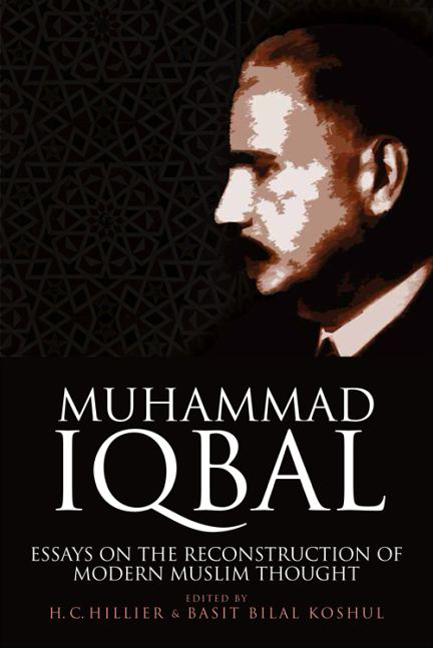Book contents
- Frontmatter
- Contents
- Preface
- 1 Introduction
- 2 The Human Person in Iqbal's Thought
- 3 Achieving Humanity: Convergence between Henri Bergson and Muhammad Iqbal
- 4 The Contemporary Relevance of Muhammad Iqbal
- 5 Pragmatism and Islam in Peirce and Iqbal: The Metaphysics of Emergent Mind
- 6 Between Hegel and Rumi: Iqbal's Contrapuntal Encounters with the Islamic Philosophical Traditions
- 7 Reconstructing Islam in a Post-metaphysical Age: Muhammad Iqbal's Interpretation of Immortality
- 8 Iqbal, Bergson and the Reconstruction of the Divine Nexus in Political Thought
- 9 Muhammad Iqbal: Restoring Muslim Dignity through Poetry, Philosophy and Religious Political Action
- Index
5 - Pragmatism and Islam in Peirce and Iqbal: The Metaphysics of Emergent Mind
Published online by Cambridge University Press: 10 October 2017
- Frontmatter
- Contents
- Preface
- 1 Introduction
- 2 The Human Person in Iqbal's Thought
- 3 Achieving Humanity: Convergence between Henri Bergson and Muhammad Iqbal
- 4 The Contemporary Relevance of Muhammad Iqbal
- 5 Pragmatism and Islam in Peirce and Iqbal: The Metaphysics of Emergent Mind
- 6 Between Hegel and Rumi: Iqbal's Contrapuntal Encounters with the Islamic Philosophical Traditions
- 7 Reconstructing Islam in a Post-metaphysical Age: Muhammad Iqbal's Interpretation of Immortality
- 8 Iqbal, Bergson and the Reconstruction of the Divine Nexus in Political Thought
- 9 Muhammad Iqbal: Restoring Muslim Dignity through Poetry, Philosophy and Religious Political Action
- Index
Summary
The Qur'an opens our eyes to the great fact of change …
Iqbal, The Reconstruction of Religious Thought in Islam (2006: 12)Introduction: Key Concepts in Iqbal and Peirce
The ‘change’ that Iqbal refers to is not change simplicitur, which would be indistinguishable from chaos; it is change that has a direction, a purpose, a personality. It is change in time, and time implies precisely these characteristics of direction, purpose, and personality. The great metaphysical question that pervades the work of both Muhammad Iqbal and Charles Sanders Peirce is: what is it that drives this change? What is its direction, purpose, and personality? The most basic answer to this question about what drives this change is: mind. But what is mind? What is the direction, purpose, and personality of mind?
The question of what mind is, of what consciousness is, is a question that vexes contemporary philosophy and contemporary science. The tools of contemporary philosophy and science seem inadequate to the task of illuminating the nature of mind. One strategy is simply to deny the reality of mind. The first move in this strategy was made by Gilbert Ryle in The Concept of Mind where he referred to mind as the ‘ghost in the machine’ (1949: 15–16). It is an ironic gesture, since it is by virtue of their own minds that philosophers and scientists deny the reality of mind. Peirce and Iqbal, in part or largely, informed by their religious faith and tradition, have a very complicated, and empirical, theory of mind. It is a metaphysical theory of mind. It is metaphysical in the Kantian sense that, while it transcends all physical description, it makes sense of all of our physical experiences.
Both Iqbal and Peirce, I will argue, naturalise mind. They will find signs of mind in nature, and signs that mind is manifested throughout nature. Mind just is the principle by which change in nature occurs. Both Iqbal and Peirce are writing post-Darwin, and both accept Darwin's theory of evolution as a valid theory of nature. Peirce was, himself, a scientist, and Iqbal was a great respecter of science.
- Type
- Chapter
- Information
- Muhammad IqbalEssays on the Reconstruction of Modern Muslim Thought, pp. 88 - 111Publisher: Edinburgh University PressPrint publication year: 2015

